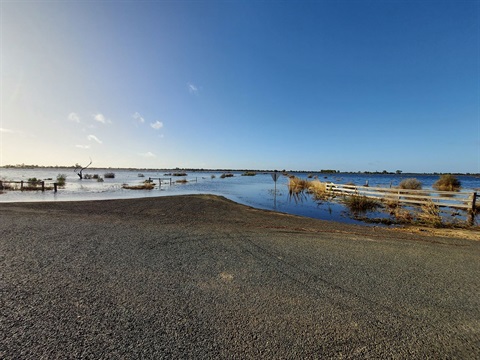Council welcomes 2022 flood inquiry final report
Published on 06 August 2024

Gannawarra Shire Council has welcomed the tabling of the Victorian Legislative Council Environment and Planning Committee’s Final Report for the Inquiry into the 2022 Flood Event in Victoria, and will advocate for various key recommendations to be actioned.
Developed following 18 months of community engagement opportunities and public hearings, the final report identifies key areas for improvement in Victoria’s approach to disaster management, building on the learnings from major flooding that impacted the State during late 2022 and early 2023.
The final report features 90 findings, resulting in 73 recommendations the committee is asking the State Government to implement.
“Gannawarra Shire Council is pleased to have advocated for our residents’ needs during this inquiry, despite the committee not holding any gatherings west of Echuca or the final report featuring any recommendations specifically to the Gannawarra Shire,” Council Chief Executive Officer, Geoff Rollinson said.
“Gannawarra was one of 19 councils to develop a submission for the inquiry, developed following input from residents impacted by the 2022 floods, Gannawarra Community Recovery Committee members, flood wardens/observers and Council staff. The development of this document played an important role in the Gannawarra’s recovery process by enabling residents the opportunity to tell their story and more importantly, put forward solutions to mitigate future flood risk.
“Our residents also played their part in contributing to this inquiry, with 25 of the 608 submissions from flood-affected local government areas in northern Victoria coming from residents or organisations based in the Gannawarra Shire.”
Twenty of the final report’s recommendations addressed many of the 37 recommendations Council identified in its submission, including:
- Regular updating of flood studies, which are managed and resourced by regional catchment management authorities and developed with guidance from local councils.
- The review of the Victorian Floodplain Management Strategy to examine issues around rural levee management and consideration of the adequacy of taxpayer support for maintaining these systems.
- The funding of a pilot ring levee development program in northern Victoria to protect homes in flood-prone areas.
- Ensuring culvert infrastructure in high-risk flood areas is fit for purpose.
- Conducting an audit of transport links in and out of disaster-prone areas.
- Calling on the Victorian Government to work with the Federal Government to ensure the Disaster Recovery Funding Arrangements are not unduly burdensome, and that bills relating to natural disaster management are paid on time.
- The adaptation of policies and funding models to prioritise betterment initiatives.
- Identifying and filling critical gaps in Victoria’s river height gauge network.
- Improvements to the accuracy, timeliness, and relevance of the VicEmergency notification service during an emergency.
- The need for the State and Federal governments to address digital connectivity limitations, focusing on rural and remote areas.
- Establishing long-term community awareness initiatives to ensure the public understand flood risk and actions.
- Increasing funding for the training of volunteers to boost the capacity of State Emergency Service units.
- Improvements to the management and distribution of sandbags during a flood event.
- The establishment of statewide operating guidelines for Emergency Relief Centres.
“The Gannawarra was better prepared for the 2022 floods thanks to learnings implemented following the 2011 floods, and we call on the State Government to implement all of the inquiry’s recommendations to ensure we are prepared for the next flood event,” Mr Rollinson said.
Lower Loddon flood observer, Colin Myers welcomed the release of the inquiry’s final report.
“We are leading the way in most of what is recommended,” he said.
“What we need is a central point where people can get all the information available for the general public so we, as flood observers, can inform the community and provide the correct information.”